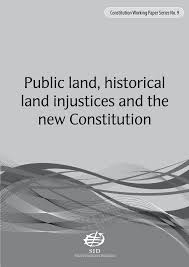Resource information
Underpinned by the concept of entitlement as its theoretical paradigm, this study examines the genesis of public land ownership and its disposition in the post-colonial era, how this has disadvantaged some sections of society and given rise to claims of historical land injustices. From this analysis, the study makes proposals on how best to redress historical land injustices and disputed land allocations, as well as the institution of an effective National Land Commission as envisaged by the Constitution.Literature from various local and international sources related to land reforms and land use in postcolonial states formed the research base. The study makes four significant recommendations: First, the study contends that the public must be sensitized through civic education on the benefits of land reform that aims to achieve three objectives:equity in terms of opportunities for land access and ownership; efficiency in terms of improved land use; and development of the national economy. Second, the National Land Commission should be sufficiently funded, be accessible to the public, and be empowered to impose significant penalties on non-compliance with the law on land management and administration. In this regard there must be mechanisms in place for monitoring the activities of the professionals, ensuring that errant professionals are penalized and providing opportunities for the public to report any errant professionals. Third,the study recommends the establishment of a Land Claims Tribunal to handle land restitution claims,including land repossession, in a clearly defined process. And finally, the study recommends that redistribution and resettlement programmes must be guided by a legal framework to ensure fairness and transparency.


